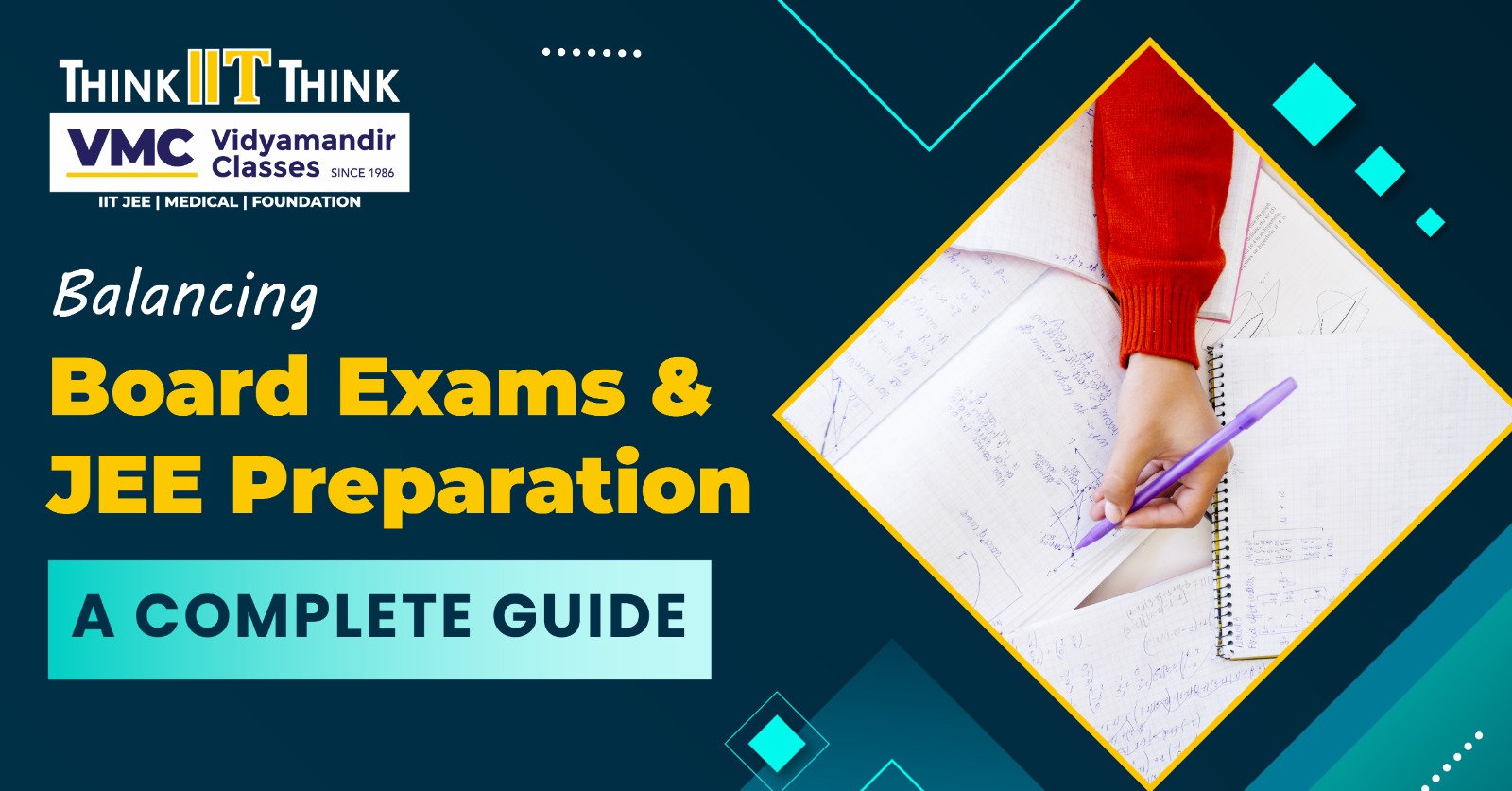Balancing Board Exams & JEE Preparation: A Complete Guide
 Posted On
Posted On
153 total views, 2 views today
Preparing for both the Board exams and JEE can be one of the biggest challenges students face in their academic journey. For students in Class 12 aiming to crack the JEE while also scoring high in their board exams, achieving a balance between the two can feel daunting. Although each exam has distinct requirements, there are some overlaps in the syllabus that can be strategically used to tackle both. Here’s a comprehensive guide to help you organize your time, build a study plan, and manage stress to excel in both exams.
Understanding Exam Patterns and Syllabus
The first step to effective preparation is understanding what each exam entails in terms of syllabus, pattern, and skill requirements.
Board Exams: Board exams are theory-oriented and require a strong grasp of writing and presentation skills. Each board—whether CBSE, ICSE, or state boards—follows a set curriculum focused on core academic knowledge. Success in these exams depends on thorough understanding and retention.
JEE: Unlike board exams, JEE tests a student’s conceptual clarity, problem-solving skills, and ability to apply knowledge to new situations. The exam is divided into two stages: JEE Main and JEE Advanced, each with increasing levels of difficulty. Students must focus on understanding and applying concepts in Physics, Chemistry, and Mathematics rather than rote learning.
Creating an Effective Study Plan
An efficient study plan is crucial for balancing both exams without compromising on either. To maximize productivity:
- Allocate Time Strategically: Dedicate specific time blocks to each subject and prioritize based on your strengths and areas needing improvement. For example, you may devote morning hours to subjects that need intense focus, while the evening could be reserved for revision and lighter topics.
- Breaks to Boost Productivity: Incorporate short breaks every couple of hours to rejuvenate your mind and maintain focus throughout the day.
- Set Clear Goals: Define weekly and monthly targets for both board and JEE syllabus. This will help you stay on track and make necessary adjustments as you progress.
Utilize Common Topics
Identify topics that overlap between the board syllabus and JEE. Subjects like Physics, Chemistry, and Mathematics have areas where the syllabus coincides, allowing you to prepare for both exams simultaneously. Mastering these common topics not only saves time but also deepens your understanding, benefiting you in both exams.
- Physics: Focus on core topics like Mechanics, Thermodynamics, and Electromagnetism.
- Chemistry: Chapters on Organic and Inorganic Chemistry are important for both exams.
- Mathematics: Calculus, Algebra, and Coordinate Geometry are essential topics for both board and JEE exams.
By leveraging these topics, you reduce the workload and create a solid foundation across both areas.
Strengthening Conceptual Understanding
In-depth understanding of concepts is fundamental to success in JEE. Unlike board exams that emphasize retention, JEE requires you to apply concepts to complex problems. Strengthen your conceptual knowledge by:
- Exploring the ‘Why’ and ‘How’: Don’t just memorize formulas; focus on understanding the reasoning behind them. This approach will help you tackle a variety of questions in JEE.
- Utilizing Resources: Use reference books, online resources, and video lectures to explore complex topics. This extra effort will enhance your understanding and give you an edge in JEE.
- Regular Practice: Solve various types of questions related to each concept. This not only solidifies your understanding but also prepares you to handle tricky problems under exam conditions.
Practice with Previous Year Papers
One of the best ways to get acquainted with the exam patterns and types of questions asked is by practicing past papers. This step is essential for both board and JEE preparation.
- Board Exam Papers: Practicing board exam papers helps improve writing speed, presentation skills, and enhances familiarity with the question patterns.
- JEE Papers: For JEE, solving previous years’ papers improves your problem-solving speed, accuracy, and time management. Analyze your performance to identify weak areas and focus on them during revision.
Managing Stress and Staying Motivated
Balancing board exams with JEE preparation can be overwhelming, and stress management is key to sustaining long-term focus. Here are some ways to stay motivated and stress-free:
- Mindfulness and Relaxation: Incorporate mindfulness exercises, deep breathing, or short meditation sessions into your routine. This will help clear your mind, reduce anxiety, and improve concentration.
- Physical Activity: Regular exercise or engaging in hobbies can provide a refreshing break from studies. Physical activity boosts mental well-being, making it easier to stay focused and positive.
- Stay Optimistic: Remind yourself of the goals you’ve set and celebrate small achievements along the way. Keeping a positive mindset helps you stay resilient in the face of challenges.
Seek Help and Guidance
Don’t hesitate to reach out for help. Whether it’s guidance from teachers, discussions with peers, or coaching classes, support can go a long way in enhancing your preparation.
- Teacher Guidance: Teachers can provide tips on time management and studying techniques, making it easier to handle both board and JEE preparation.
- Study Groups: Studying in groups can also be beneficial as discussing topics with peers often leads to better understanding.
- Additional Resources: Coaching classes and online courses offer structured preparation, resources, and expert insights that can make your preparation more effective.
Prioritizing Health and Well-Being
Good physical and mental health is essential for effective preparation. A balanced diet, proper sleep, and emotional well-being will increase your productivity and concentration.
- Nutrition and Sleep: Eat a well-balanced diet that includes all essential nutrients, and aim for 7-8 hours of sleep each night to stay mentally alert.
- Flexibility in Study Plan: Be open to adjusting your study plan as needed. If a method isn’t working, try something new. Flexibility allows you to adapt to changing demands and prevents burnout.
Flexibility and Resilience
While consistency is key, it’s equally important to remain flexible in your approach. Life doesn’t always go as planned, so being open to changes in your schedule or strategy can make a huge difference.
- Modify When Needed: If a topic takes longer than expected, adjust your plan without feeling disheartened. Adaptability helps you maintain momentum even in challenging situations.
- Explore New Strategies: If your study techniques become monotonous or unproductive, consider exploring new methods like flashcards, teaching concepts to friends, or online tutorials.
Final Thoughts
Balancing board exams with JEE preparation requires commitment, planning, and a positive outlook. With effective time management, focused study plans, and regular practice, you can confidently tackle both. Remember that setbacks are part of the journey; stay motivated, be adaptable, and give each day your best effort. This approach not only helps you strike a balance but also empowers you to perform at your best in both exams. Stay focused, work diligently, and success will follow.



